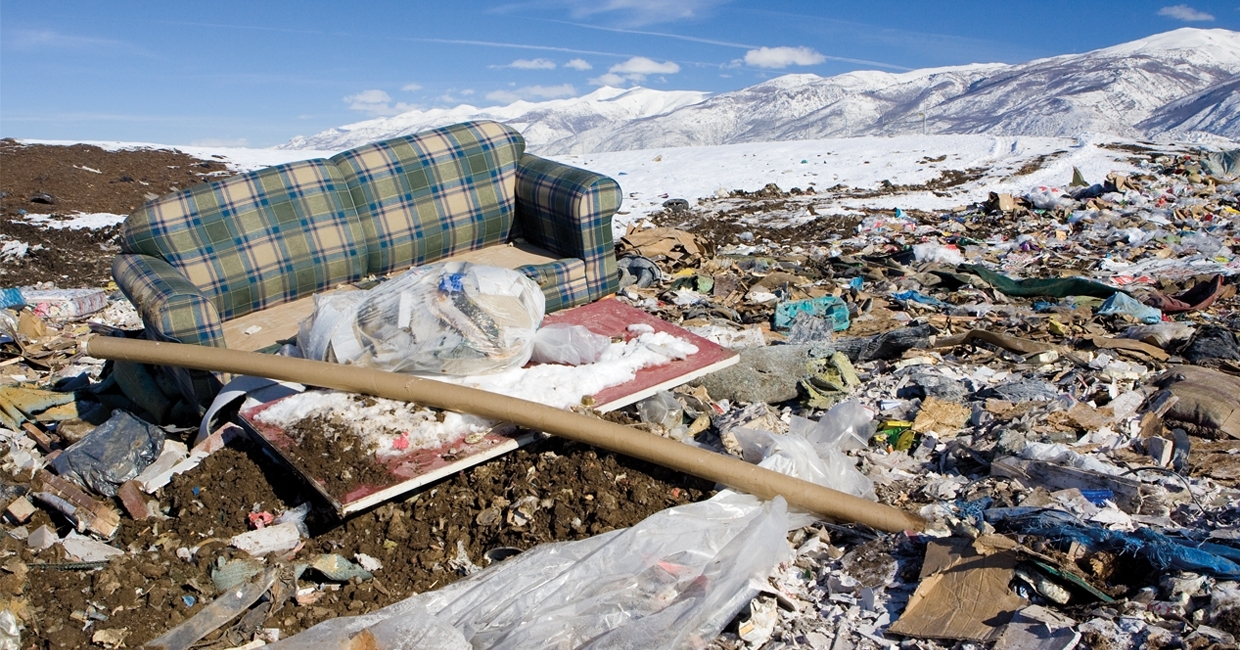The UK furniture industry is becoming increasingly mindful of the environmental impact of waste product – but what of its looming economic impact? As fresh legislation promises to catalyse the diversion of goods away from landfill and towards recycling and reuse, Furniture News asks the experts how businesses can get ahead of the circular economy curve …
According to a 2018/19 report by The North London Waste Authority, 22 million pieces of furniture are discarded each year in the UK, the majority of which goes directly to landfill. Climate action NGO WRAP estimates this to be the annual fate of 670,000 tonnes of furniture – much of it reusable.
These are just two of the headlines atop a (literally) mounting environmental crisis, and while the data varies from source to source, the numbers are astronomical – especially given the nation’s dwindling capacity to dispose of such volumes. Sometimes it takes a glimpse of a sofa or mattress at the dump, or fly-tipped by the side of a road, to make one start to appreciate the sheer amount of space these goods might occupy in such numbers.
Government legislation is making headway to prevent the most egregious approaches – this year, a ban on the disposal of upholstery containing POPs (Persistent Organic Pollutants) in general waste or landfill sites came into force, and extended producer responsibility (EPR) schemes for mattresses and cabinet furniture are not far off.
At the same time, new routes to recycling and reuse are emerging. Rather than awaiting the impact of such legislation, and driven by a passion to create change sooner rather than later, various specialists are working to deliver fresh, rewarding solutions, which complement the well-documented efforts of the trade’s more progressive manufacturers.
This month, Furniture News asked several of the industry’s experts to share their thoughts on the UK’s furniture disposal and reuse directions.
Nick Oettinger is the CEO of The Furniture Recycling (TFR) Group, a sustainable mattress recycling specialist whose stated aim is to divert 100% of mattresses from UK landfill. TFR Group works with businesses such as bed retailers and local authorities to recycle and repurpose mattress materials, creating a circular economy for mattresses and their component parts.
Tom Williams is the National Bed Federation’s (NBF) sustainability and circular economy lead. Notably, he looks after the NBF Pledge for Our Planet, which encourages the bed industry to become even more sustainable. He spends much of his time helping members to implement the pledge’s requirements, guiding them towards more circular operating processes.
Paul Beckett is the director of Bye Bye Bed, which focuses on the manual deconstruction of mattresses, maximising their reuse potential rather than seeing them shredded. Paul’s experience in the fillings sector enables him to assess the individual components and grade them, with poor-condition materials diverted to re-processors, and the better ones used in the company’s own products (branded Reborn).
Paul says he’s focused on increasing the ‘real rate’ recovery from its current 14%, closing the circularity gap, creating a closed-loop recycling process and reducing the emissions, power and resource in the reprocessing of usable materials – while offering consumers a product at a reduced price, and without the environmental impact of a brand-new one made from virgin raw materials.
“Re-processors were already at a near-full capacity on many of the separated components,” says Paul. “Considering that there are currently over 7 million mattresses still going to landfill, and a ban on mattresses entering landfill is imminent, the mattress recycling industry would simply be forced into landfilling separated components, rather than the industry landfilling complete mattresses. This would inevitably force recyclers to either close, or to raise the traditional mattress recycling gate fee to cover the disposal cost.”
Finally there is Daniel Hague, the commercial director of ClearCycle, a ‘recommerce’ provider focused on furniture, mattresses and other large-item categories, that works with some of the UK’s leading retailers to offer a tailored refurbishment and resale solution for problem stock (primarily consumer returns, overstock, and stock that may have failed QC checks).
We asked each member of the panel to share their take on the UK’s furniture waste problem, the implications of incoming legislation, and the challenges (and benefits) of better processes …
Read what they had to say in February's Furniture News, here.







